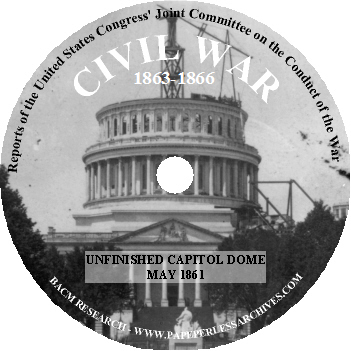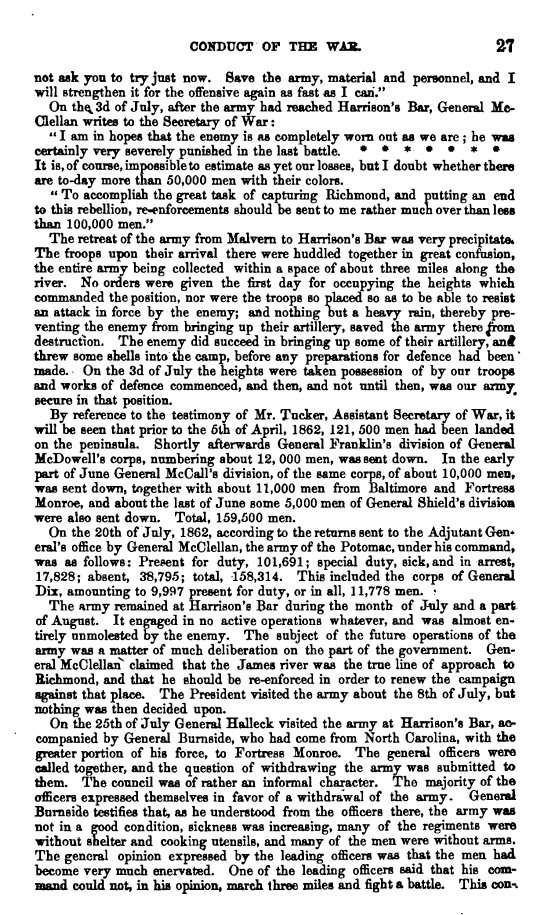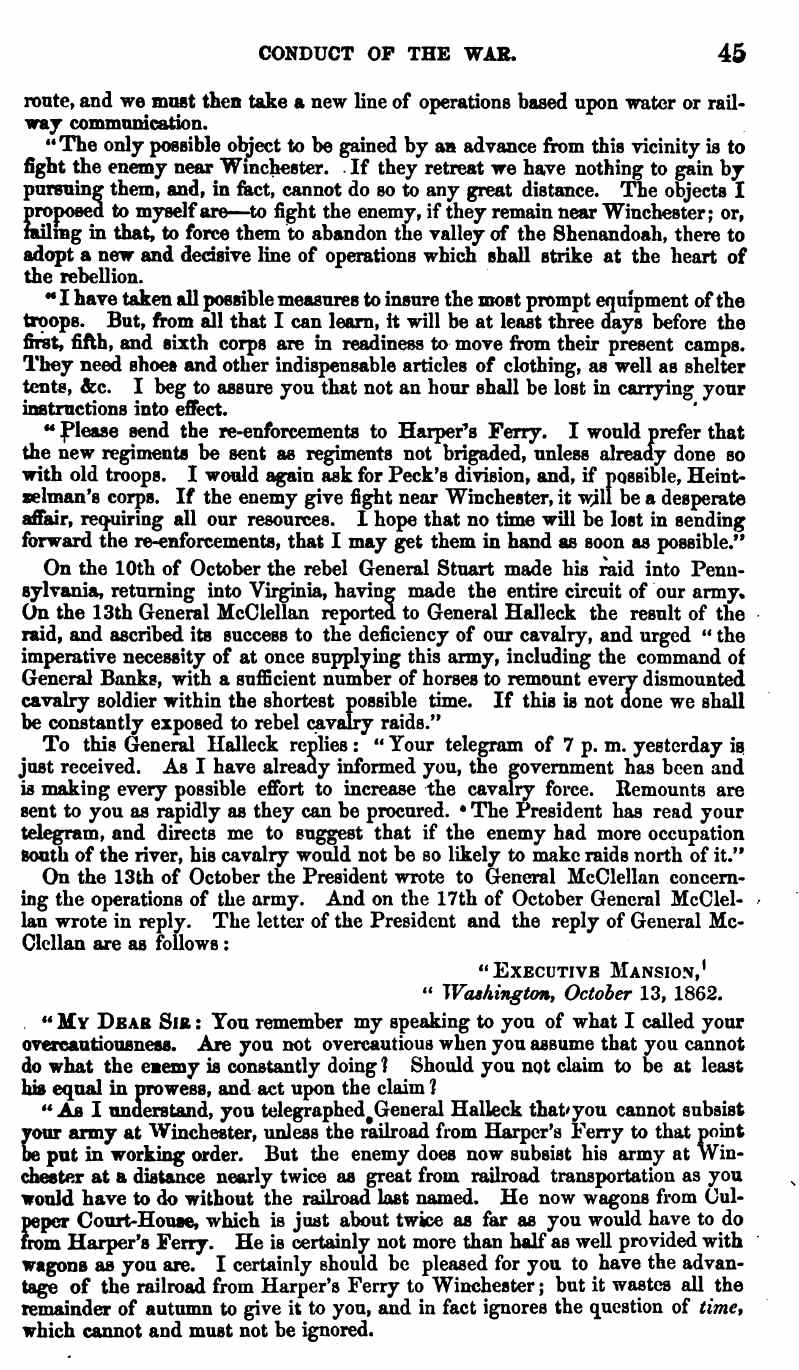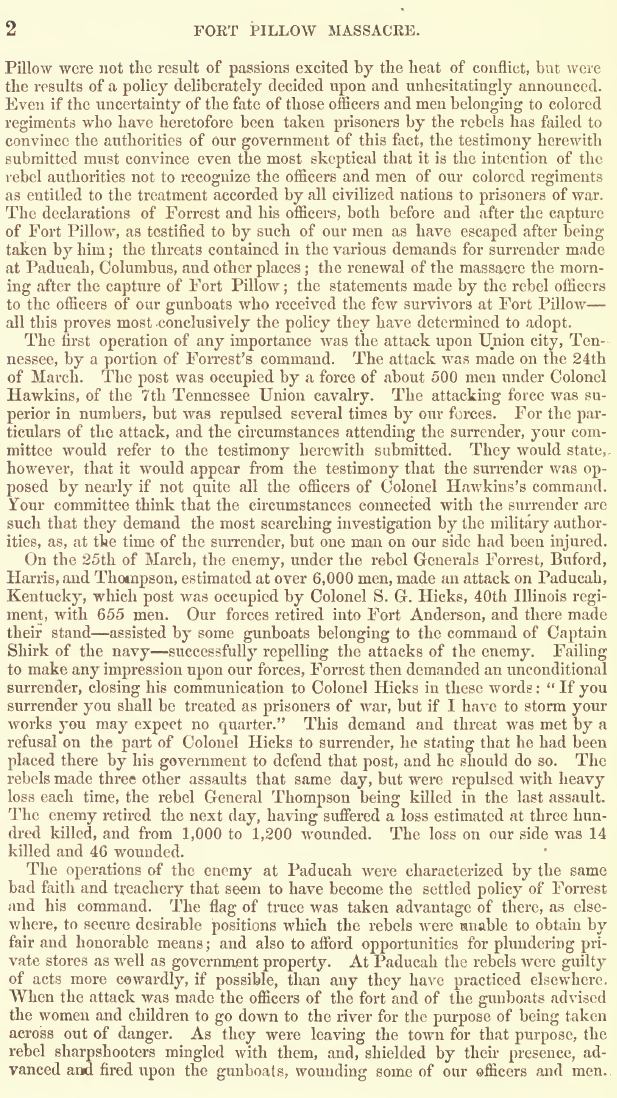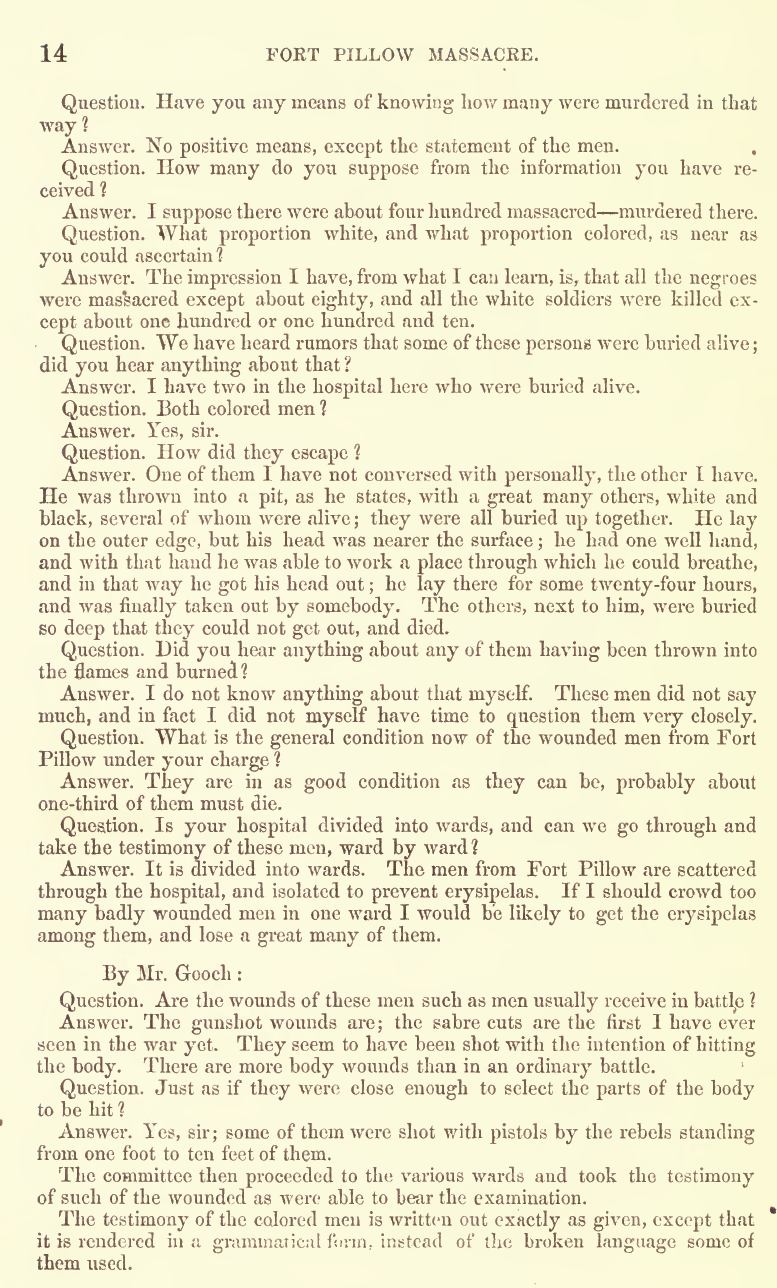|
The Joint Committee on the Conduct of the War, also known as the War Committee, was established on December 9, 1861, following the embarrassing Union defeat at the Battle of Ball's Bluff, at the behest of Senator Zachariah T. Chandler of Michigan. It held its last proceedings in May 1865.
The Committee investigated issues such as illicit trade with the Confederate states, medical treatment of wounded soldiers, military contracts, and the causes of Union battle losses. The Committee majority endorsed emancipation, the use of black soldiers, and the appointment of generals who were known to be aggressive fighters. It was chaired throughout its existence by Senator Benjamin Wade of Ohio, and became identified with the Radical Republicans who wanted more aggressive war policies than those of Abraham Lincoln.
The Committee produced volumes compiling its copious reports based on its field work and the testimony of dozens of witnesses. Eight volumes were published periodically throughout the committee's four-year tenure.
During the committee's existence, it held 272 meetings and received testimony in Washington and at other locations, often from military officers. Though the committee met and held hearings in secrecy, the testimony and related exhibits were published at irregular intervals. Two Supplemental volumes published in 1866 include the original manuscripts of certain postwar reports that the committee received from the army.
This collection includes:
Report of the Joint Committee on the Conduct of the War at the second session Thirty-eighth Congress (1863) Part 1
Report of the Joint Committee on the Conduct of the War at the second session Thirty-eighth Congress (1863) Part 2
Report of the Joint Committee on the Conduct of the War at the second session Thirty-eighth Congress (1863) Part 3
Fort Pillow Massacre (1864)
Returned Prisoners (1864)
Report of the Joint Committee on the Conduct of the War at the second session Thirty-eighth Congress (1865) Volume 1
Report of the Joint Committee on the Conduct of the War at the second session Thirty-eighth Congress (1865) Volume 2
Report of the Joint Committee on the Conduct of the War at the second session Thirty-eighth Congress (1865) Volume 3
Supplemental report of the Joint committee on the conduct of the war, in two volumes (1866) Volume 1
Supplemental report of the Joint committee on the conduct of the war, in two volumes (1866) Volume 2
The committee's first report was issued in 1863, in three parts. Part 1 covered the Army of the Potomac. Part 2 covered the Union's 1861 Eastern Theater losses at First Bull Run and at Ball's Bluff. Part 3 covered the war's Western Theater.
The committee's second report was given in two parts in 1864. The first part presented reports and testimony taken involving the alleged Confederate mistreatment of United States Colored Troops following their surrender at Fort Pillow. The Battle at Fort Pillow ended with a massacre of surrendered Federal black troops by soldiers under the command of Confederate Major General Nathan Bedford Forrest. The second part related to the condition of returned Union soldiers after their imprisonment in Confederate POW camps.
The third report issued in 1865 was more comprehensive than the first two years' works. The report was released in three parts that covered a wide variety of issues: The Mine Crater incident during the Siege of Petersburg, the Fort Pillow episode, the military expeditions at Fort Fisher and up the Red River. Extensive testimony was taken on the subject of ordnance, contracts to supply ice for the war effort, turreted Monitor-class warships, and the massacre of friendly Cheyenne Indians at Sand Creek, Colorado. Includes the journal of the committee, Jan. 20, 1864-May 22, 1865.
In 1866, a two volume supplement was published presenting reports made to the Joint Committee on the Conduct of the War by Major General W. T. Sherman, Major General George H. Thomas, Major General John Pope, Major General J. S. Foster, Major General A. Pleasanton, Major General E. A. Hitchcock, Major General P. H. Sheridan, and Brigadier General James B. Ricketts.
Each page is graphically reproduced on the disc. A text transcript of all computer recognizable text is embedded into the graphic image of each page of each document, creating a searchable finding aid. Text searches can be done across all files on the disc.
About the Joint Committee on the Conduct of the War
Resolution passed: Senate, December 9, 1861; House, December 10, 1861
Final report issued: May 22, 1865
Chairman: Senator Benjamin Wade (R-OH)
Committee members:
Zachariah Chandler (Senate, R-MI)
John Covode (House, R-PA); replaced by Benjamin Loan (R-MO)
Daniel Gooch (House, R-MA)
Andrew Johnson (Senate, D-TN); replaced by Joseph Wright (Unionist-IN); replaced by Benjamin Harding (D-OR)
George Julian (House, R-IN)
Moses Odell (House, D-NY)
Origins of the Committee
On Sunday, July 21, 1861, several members of Congress journeyed from Washington, D.C., to Centreville, Virginia, to watch the Union Army march into battle. On a hill overlooking Bull Run Creek, lawmakers, joined by journalists and other curious civilians, ate picnic lunches as they watched the battle (thus known as the "Picnic Battle"). As journalist Benjamin Perley Poore commented, spectators gathered "as they would have gone to see a horse-race or to witness a Fourth of July procession." The Union Army performed well in the morning, but by early afternoon the Confederates had turned the tide with reinforcements. When Union generals finally called retreat around 4:00 p.m., the frightened soldiers fled for their lives, sweeping up civilians in their retreat back to Washington.
Near the battlefield, a group of senators heard a loud noise and looked around to see the road filled with retreating soldiers, horses, and wagons. "Turn back, turn back, we're whipped," Union soldiers cried as they ran past the spectators. Startled, Michigan senator Zachariah Chandler tried to block the road to stop the retreat. Senator Benjamin Wade of Ohio, sensing a humiliating defeat, picked up a discarded rifle and threatened to shoot any soldier who ran. While Senator Henry Wilson of Massachusetts distributed sandwiches, a Confederate shell destroyed his buggy, forcing him to escape on a stray mule. Iowa senator James Grimes barely avoided capture and vowed never to go near another battlefield. Dismayed, senators returned to Washington to deliver eyewitness accounts to a stunned President Lincoln. (Benjamin Perley Poore, Perley's Reminiscences of Sixty Years in the National Metropolis, vol II, (Philadelphia: Hubbard Brothers, Publishers, 1886), 84-85; Margaret Leech, Reveille in Washington, 1860-1865, (New York: Harper and Brothers, 1941), 99-103)
Committee Process
To the dismay of many northerners, the defeat at Bull Run was the first in a series of Union military disasters. Causalities mounted and in October Senator Edward D. Baker of Oregon, a close friend to President Lincoln, died at the Battle of Ball's Bluff. In the opening days of the 37th Congress (1861-1863), the public and elected officials called for an inquiry into events surrounding the dramatic defeats suffered by the Union Army. Senator William Pitt Fessenden of Maine articulated the thoughts of many when he said, "We see many things done which do not meet the public approbation. We see some things done which we do not approve ourselves, and which evidently call for an investigation, or, at any rate, call for such an explanation as shall satisfy the people." (The Congressional Globe, 37th Cong., 2d sess., 9 Dec, 1861, 30.)
In that spirit, Senator Chandler introduced a resolution on December 5, 1861, to investigate the battles at Bull Run and Ball's Bluff, while other senators demanded a broad inquiry into the conduct of the war. Consequently, Senator Grimes amended the resolution, calling for a joint committee to examine all aspects of the war. The concurrent resolution, passed on December 10, 1861, created a joint committee comprised of three senators and four representatives and granted its members the power to "inquire into the conduct of the present war and to send for persons and papers." (The Congressional Globe, 37th Cong., 2d sess., December 5, 9, 10, 1861, 16, 32, 40; Bruce Tap, Over Lincoln's Shoulder: The Committee on the Conduct of the War, (Lawrence: The University of Kansas Press, 1998), 24.)
Five Republicans and two Democrats served on the committee, reflecting Republican control of the Civil War era Congress. Traditionally, the senator who proposed the resolution chaired the committee, but Chandler deferred to his close friend and colleague Senator Wade, believing that the Ohioan's legal background made him particularly well suited for directing the investigation.(The Congressional Globe, 37th Cong., 2d sess., 17 Dec 1861, 110.)
Members of the joint committee agreed to keep their deliberations secret. Meeting in a Senate committee room, the joint committee held no public hearings and forbade those who testified from speaking with the press. (Elizabeth Joan Doyle, "The Conduct of the War, 1861," in Arthur M. Schlesinger, Jr. and Roger Bruns, eds. Congress Investigates: A Documented History, 1792-1974, vol II, 1204, 1228-1231.)
Committee members regularly broke their own rules, however, leaking information to newspapers to generate public support for their efforts. In March of 1862, for example, committee members leaked the written statement of General John C. Frémont, commander of the Western Department and a favorite of the committee, to the New York Daily Tribune. They hoped to enlist public opinion behind General Frémont's controversial actions in the field, and to draw upon this well of public support to lobby Lincoln for Frémont's reappointment. (Bruce Tap, Over Lincoln's Shoulder: The Committee on the Conduct of the War, (Lawrence: The University Press of Kansas, 1998), 93-94.)
Committee Investigations
Committee investigations were driven, in part, by allegations published in popular newspapers about the performance of commanders and conditions in the field. Following newspaper accounts that General William R. Montgomery treated soldiers "inhumanely and disloyal men and women very leniently," the Joint Committee called on Montgomery to testify to the charges. ("General Montgomery," Chicago Tribune, 14 Feb, 1862, 1.)
Abolitionists known as "Radical Republicans" dominated the committee and frequently criticized the president's war strategy as not being aggressive enough. Senator Wade, irritated by the president's gradual approach to emancipation and equality for African Americans, dismissed Lincoln as "a fool." (Benjamin Wade to Caroline Wade, 25 Oct 1861, Benjamin F. Wade Papers, Manuscript Division, Library of Congress)
The joint committee itself faced criticism from Washington insiders who decried its work as misguided and ill-informed. Critics noted that the joint committee was well-intentioned, but that its members had no military experience and seemed unqualified to analyze war-related decisions and the commanders who made them. Some military leaders dismissed the inquiry as partisan or ideological and not in the nation's best interest. Benjamin Perley Poore denounced the committee as "a mischievous organization, which assumed dictatorial powers." (Poore, Perley's Reminiscences of Sixty Years in the National Metropolis, 103-104.)
Regardless of such criticism, the Joint Committee on the Conduct of the War pursued a broad investigatory agenda. In addition to examining failed military campaigns, the committee scrutinized a number of wide-ranging issues, including corruption in military supply contracts, the mistreatment of Union prisoners by Confederate forces, the massacre of Cheyenne Indians, Union trade activities, and gunboat construction, to name just a few. The joint committee worked through two Congresses, meeting 272 times over four years. Subcommittees were formed to maximize time and resources and meet with as many witnesses as possible. (Doyle, "The Conduct of the War, 1861," 1201; Chicago Tribune 11 Apr 1862, 2.)
Members frequently traveled outside of Washington, D.C., recording testimony from witnesses and making first-hand assessments of the war effort. One inquiry included a visit to a nearby army convalescent center in Alexandria, Virginia, to document the treatment of Union soldiers by medical teams. ("Report of the Joint Committee on the Conduct of the War, Journal of the Committee," xiii-xiv)
Despite Senator Wade's withering assessment of Lincoln, the joint committee maintained friendly relations with the executive branch. President Lincoln and his successor Andrew Johnson (a former member of the joint committee), and their cabinets, complied with committee requests for meetings and access to information. Members of the joint committee frequently blamed military commanders for Union losses, often accusing them of disloyalty to the government, and they pressed for changes in military command. They strongly encouraged Lincoln to remove Major General George McClellan from his command of the Army of the Potomac after successive losses early in the war. The president eventually relieved McClellan in November of 1862, but he did so on his own terms, largely disregarding the joint committee's recommendations. The joint committee proved more convincing in another case, however, and the president acquiesced to its demands that he approve the arrest and imprisonment of Brigadier General Charles Pomeroy Stone. The committee had long questioned Stone's loyalty, and blamed him for Union defeats.
The Joint Committee on the Conduct of the War produced volumes of copious reports based on its field work and the testimony of dozens of witnesses. Published periodically throughout the committee's four-year tenure, these reports were often summarized in newspapers. Nevertheless, in comparison to other congressional investigations, the work of the Joint Committee on the Conduct of the War remained mostly unknown to the American public. Despite this low-profile status, the committee's investigations fulfilled the congressional responsibility for oversight during a time of national crisis. Committee members felt satisfied that their inquiry prompted President Lincoln to more carefully consider the strategy and evaluate the performance of his top field commanders. Interviews with military commanders provided detailed accounts of action in the field, while creating a record of wartime events which otherwise would not have been preserved.
Source: "Joint Committee on the Conduct of the War, Notable Senate Investigations, U.S. Senate Historical Office, Washington, D.C."
|
